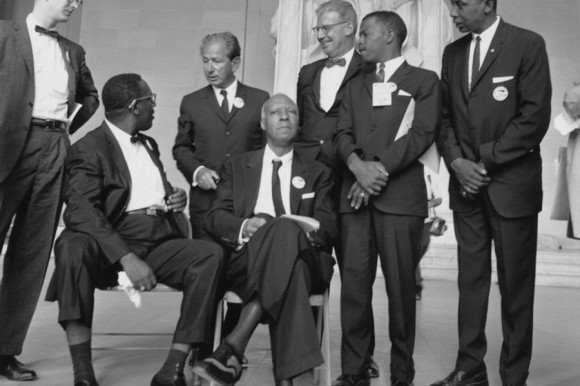The Labor-Civil Rights Connection
Join us at 7 a.m. Monday, Feb. 3, to reflect on the labor-civil rights connection as well as the essential contribution made by A. Philip Randolph to both movements. For Randolph, an avowed socialist, enduring economic empowerment was won through the kind of collective action required by union organizing.
It tracks that the massive gathering Randolph helped organize in 1963 at which the Rev. Dr. Martin Luther King gave his “I Have a Dream” speech was called the March on Washington for Jobs and Freedom.
In 1925 A. Philip Randolph founded the Brotherhood of Sleeping Car Porters, the first African American labor union. According to the Library of Congress, the Pullman Palace Car Company was started by George Pullman in 1867, right after the Civil War “purposefully hiring formerly enslaved people to achieve the high-quality customer service the Pullman cars were known for. Sleeping car porters shined shoes, made up the beds, woke passengers, and provided other services to ensure a comfortable trip.”
It took over a decade for the Brotherhood to win their first contract. Initially, Randolph affiliated his union with the American Federation of Labor even though close to half of the local AFL unions expressly excluded Black workers.
In 1938, the Brotherhood of Sleeping Car Porters aligned with the Congress of Industrial Organization. According to James Gilbert Cassedy, the CIO “sought to organize industrial workers regardless of race or ethnic background” which “contributed to an alleviation of the historic conflict between African Americans and trade unions.”
In 1941, as the U.S. was gearing up for war, Randolph led the call for a March on Washington to demand the federal government end racial discrimination.
“While billions of the taxpayers’ money are being spent for war weapons, Negro workers are being turned away from the gates of factories, mines, and mills being flatly told, ‘NOTHING DOING’,” Randolph wrote. “Some employers refuse to give Negroes jobs when they are without ‘union cards,’ and some unions refuse Negro workers union cards when they are ‘without jobs’.”
In June of 1941, President Franklin Roosevelt signed Executive Order 8802 barring racial discrimination in the U.S. defense program out of “the firm belief that the democratic way of life within the nation” could only be defended successfully “with the help and support of all groups within its borders.”
FDR also noted that “needed workers” had “been barred from employment in industries engaged in defense production solely because of considerations of race, creed, color, or national origin, to the detriment of workers' morale and of national unity.”
Bob Hennelly will host Joe Wilson, author of Tearing Down the Color Bar: A Documentary History and Analysis of Brotherhood of Sleeping Car Porters. Larry Hamm, long time social justice activist and Charles Hall, president of Local 108 RWDSU-UFCW-AFL-CIO will also offer their perspectives.
